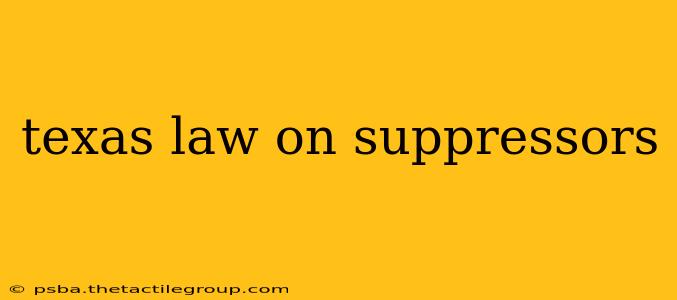Texas law regarding firearm suppressors, also known as silencers, can be complex. This guide aims to clarify the legal landscape, helping Texans understand the rules and regulations surrounding their ownership and use. Disclaimer: This information is for educational purposes only and should not be considered legal advice. Always consult with a qualified legal professional for advice tailored to your specific situation.
Legality of Suppressors in Texas
In Texas, suppressors are regulated under both federal and state law. Federally, they are classified as National Firearms Act (NFA) items, requiring registration with the Bureau of Alcohol, Tobacco, Firearms and Explosives (ATF) and adherence to strict regulations. Texas state law largely mirrors federal regulations, adding no additional restrictions on their possession or use.
Obtaining a Suppressor in Texas
To legally own a suppressor in Texas, you must first comply with federal requirements:
- ATF Form 4: You must complete ATF Form 4, the application for tax payment and registration of a firearm. This involves a thorough background check, fingerprinting, and a significant waiting period.
- $200 Tax Stamp: A $200 tax stamp is payable to the ATF for each suppressor.
- Background Check: You must pass a comprehensive background check, similar to the process for purchasing a handgun.
- Waiting Period: Expect a significant waiting period, often several months, for the ATF to process your application.
Once the ATF approves your application, you can legally purchase and possess a suppressor in Texas. Remember that the suppressor must remain registered with the ATF.
Legal Use of Suppressors in Texas
While legal to own, the use of suppressors is governed by both federal and state laws. It's crucial to understand these limitations:
- Hunting: The legality of suppressor use while hunting depends on the specific game and the regulations of the particular wildlife management area. Some jurisdictions may restrict or prohibit their use. Always check local hunting regulations before using a suppressor.
- Self-Defense: Using a suppressor for self-defense is generally legal, provided you are acting in accordance with Texas self-defense laws. However, the use of a suppressor in a criminal situation can attract additional charges.
- Other Activities: Using a suppressor for target practice or other recreational activities is generally permitted, as long as it's done in compliance with all applicable laws, including noise ordinances.
Illegal Use of Suppressors
Using a suppressor to conceal the sound of a firearm during a crime significantly increases penalties. Possessing an unregistered suppressor or modifying a registered suppressor without ATF approval is also a federal offense with severe consequences.
Key Considerations for Texas Residents
- Federal Regulations Prevail: While Texas doesn't add extra restrictions, federal law takes precedence. Failing to comply with federal requirements can lead to significant legal consequences.
- Storage and Transportation: Texas law requires responsible storage and transportation of all firearms, including suppressors. Secure storage is crucial to prevent theft and unauthorized use. Transportation typically requires the suppressor to be unloaded and transported separately from ammunition.
- Local Ordinances: Always be aware of any local ordinances that might further restrict the use of suppressors within specific municipalities.
This guide provides a general overview of Texas law regarding suppressors. For specific legal advice or to ensure compliance with all applicable laws, consult with a legal professional specializing in firearms law in Texas. Staying informed about current legislation and regulations is crucial for responsible firearm ownership.

